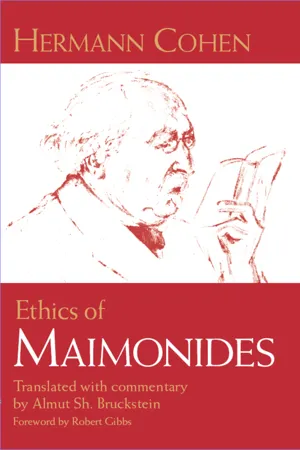
- 248 pages
- English
- PDF
- Available on iOS & Android
Ethics of Maimonides
About this book
Hermann Cohen's essay on Maimonides' ethics is one of the most fundamental texts of twentieth-century Jewish philosophy, correlating Platonic, prophetic, Maimonidean, and Kantian traditions. Almut Sh. Bruckstein provides the first English translation and her own extensive commentary on this landmark 1908 work, which inspired readings of medieval and rabbinic sources by Leo Strauss, Franz Rosenzweig, and Emmanuel Levinas.
Cohen rejects the notion that we should try to understand texts of the past solely in the context of their own historical era. Subverting the historical order, he interprets the ethical meanings of texts in the light of a future yet to be realized. He commits the entire Jewish tradition to a universal socialism prophetically inspired by ideals of humanity, peace, and universal justice.
Through her own probing commentary on Cohen's text, like the margin notes of a medieval treatise, Bruckstein performs the hermeneutical act that lies at the core of Cohen's argument: she reads Jewish sources from a perspective that recognizes the interpretive act of commentary itself.
Frequently asked questions
- Essential is ideal for learners and professionals who enjoy exploring a wide range of subjects. Access the Essential Library with 800,000+ trusted titles and best-sellers across business, personal growth, and the humanities. Includes unlimited reading time and Standard Read Aloud voice.
- Complete: Perfect for advanced learners and researchers needing full, unrestricted access. Unlock 1.4M+ books across hundreds of subjects, including academic and specialized titles. The Complete Plan also includes advanced features like Premium Read Aloud and Research Assistant.
Please note we cannot support devices running on iOS 13 and Android 7 or earlier. Learn more about using the app.
Information
Table of contents
- Contents
- Foreword
- Preface
- Introduction
- 1. Socrates and Plato: Founders of Ethics
- 2. Maimonides: A Radical Platonist
- 3. The Good beyond Being:Ethico-Political Intricacies of a Medieval Debate
- 4. Religion as Idolatry: How (Not) to Know God
- 5. The “Unity of the Heart”: On Love and Longing (Where Ethical Method Fails)
- 6. Practice and Performance: How (Not) to Walk in Middle Ways
- 7. “He Is (Not) Like You”: How Suffering Commands Self or Soul
- 8. On Eudaemonian Eschatology and Holy History: Zionism as Betrayal of the Ideal
- 9. To Create Messianic Time: A Jewish Critique of Political Utopia
- 10. The Human Face: Anticipating a Future that Is Prior to the Past
- Abbreviations
- Notes
- Bibliography
- Index